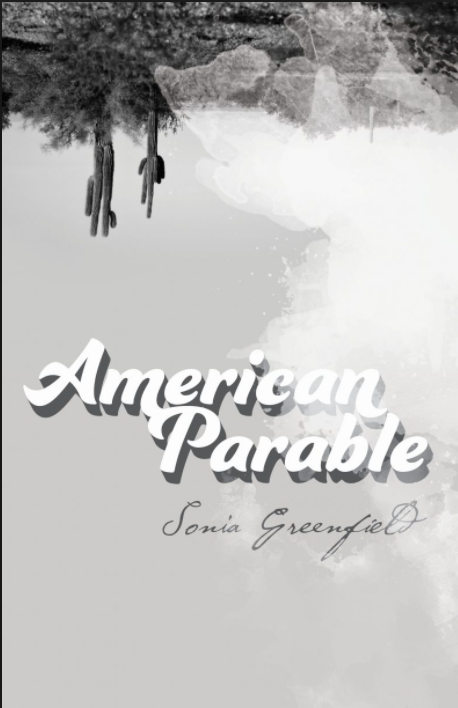ISSN: 1941-4137
POETRY THAT ENACTS THE ARTISTIC AND CREATIVE PURITY OF GLASS
POETRY THAT ENACTS THE ARTISTIC AND CREATIVE PURITY OF GLASS

Sara Pisak is a graduate student earning her MFA in creative nonfiction from Wilkes University. She is employed as a Contributing Editor at Helen: A Literary Magazine and a freelance writer/editor. Sara participates in the Poetry in Transit Program and has recently published work in the Deaf Poets Society, Five:2:One Magazine, and Moonchild Magazine. When not writing, Sara can be found spending time with her family and friends. You can follow her writing adventures on Twitter: @SaraPisak10.
January 14, 2019
Edited by Stephanie Kaylor
Edited by Stephanie Kaylor
Review of American Parable by Sonia Greenfield

American Parable
Sonia Greenfield
Autumn House Press, 2018
Sonia Greenfield’s American Parable(Autumn House Press, 2018) brings the classic elements of political satire into the 21st century. Like the great classic works of political satire such as Gulliver’s Travels, Animal Farm, and Brave New World, American Parable orients a reader in our current political and cultural climate by reflecting its strife and shortcomings. At its core, great political satire, including American Parable, upholds the image of the world, while also turning it on its head examining how society can improve. Although projecting current divides and fear, Greenfield’s work transcends the present moment by calling on the past to warn us against an even more divisive future.
Greenfield’s work exceeds the boundaries and constraints of current times through her implementation of an assured and steady speaker. The speaker’s voice is unflinchingly honest; within this honesty is a projection of hope. Paired with an uncompromising speaker, American Parable is filled with poems that vary in style and form as Greenfield blends precisely punctuated works with those completely void of punctuation as well as those poems composed of couplets and longer stanzas.
At the crux of American Parable is a world where love, kindness, and human connection have been lost in the void and replaced with derision, hatred, and intolerance. The speaker tries desperately to make sense of the current environment and longs for a world in which the former has again risen to its rightful place. In the poem, “Museum of Love,” the speaker tours a museum which allows for exploration of how society previously functioned. The speaker notes:
Things were different
Before The War, I guess.
An exhibit had photos
Of something called kissing
& the interactive center
let you experience what they
called an embrace.
In our current cultural and political climate, the speaker questions how a world can function if it is based on coldness and lack of human interaction. In a society derailed by war and suffering, the speaker considers how we can learn from our past in order to rebuild our future. The popular saying, “history repeats itself,” can only be longed for, as the speaker struggles to regain the power of human connection.
Greenfield also shows a world divided, in the title work, “American Parable.” In this piece, Greenfield tells of an America riddled with the fear of the unknown. As a result, the people look toward a “prophet” to ease their anxieties. Instead, they are given a ruler, who peddles fear and not the savior they expected. Greenfield writes:
Throw your
rocks at those people, he said,
they are to blame, so stones
flew at people who shared their land,
who kissed the faces of their children,
who raised their flags, who loved
their dogs, but who were different.
Although startling and bleak, Greenfield’s images are vibrant; they speak volumes. The lines paint a world that is not different from the world we live in, where hatred and lack of understanding often leads to blaming our fellow humans.
The chapbook as a whole and the title poem are calling for consideration and empathy to echo louder than the stark world reflecting back at the reader. Greenfield concludes the work with this message as her speaker states:
The others left on the far side
heard the knell of a bell they already
knew, lit their torches & plunged
into the darkness, familiar as they were
with the art of survival. It was time
to get to work.
Greenfield’s message of hope for understanding and cohesion comes after the “prophet” has built both mental, emotional, and physical walls to divide people. The strong and steady voiced speaker does not shy away from describing what is needed to end the darkness. When the damage is done, the residents, who still believe in the power of mankind, dissent by descending into the darkness and working to retrieve the tolerance and inclusion that their country was founded upon.
The poems in this collection are difficult to forget. As a result, something wonderful happens when reading American Parable: the reader begins to consider the part they play in the world. Readers of American Parable learn they cannot expect to change the world without first “plunging into the darkness” and changing themselves.
Visit Sonia Greenfield's Website
Visit Autumn House Press' Website
Glass: A Journal of Poetry is published monthly by Glass Poetry Press.
All contents © the author.
All contents © the author.





